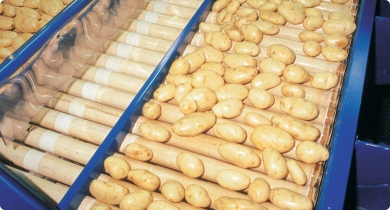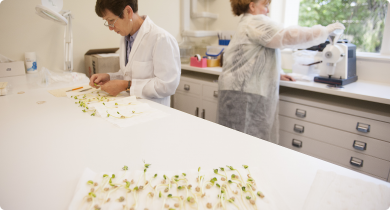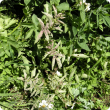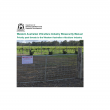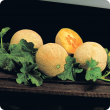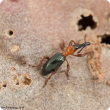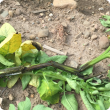Plant biosecurity
The mission of Western Australia's plant biosecurity programs is to safeguard plant resources from exotic and established pests and diseases. The Department of Agriculture and Food, Western Australia (DAFWA) has adopted a 'biosecurity continuum' approach with pre-border, border and post-border biosecurity strategies as integral components of this approach.
The aim of DAFWA’s approach is to identify key threats to productivity, sustainability and market access and outline preventive and response strategies.
The management of biological risks to market access, product safety, quality, productivity and sustainability is a shared responsibility and can be managed together and cost-effectively by means of partnerships between industry, community and government.
DAFWA’s biosecurity policies and operations are targeted to facilitate safe trade, tourism and commodity movement whilst reducing exposure of the State's plant resources to exotic biological risks.
Filter by search
Filter by topic
- Crops (62) Apply Crops filter
- (-) Remove Horticulture filter Horticulture
- Pests, weeds & diseases (54) Apply Pests, weeds & diseases filter
- Diseases (33) Apply Diseases filter
- Fruit (32) Apply Fruit filter
- Vegetables (19) Apply Vegetables filter
- Pests (16) Apply Pests filter
- Fungi (15) Apply Fungi filter
- Potatoes (12) Apply Potatoes filter
- Citrus (12) Apply Citrus filter
- Pest insects (12) Apply Pest insects filter
- Grapes & wine (11) Apply Grapes & wine filter
- Nursery & cutflowers (9) Apply Nursery & cutflowers filter
- Quarantine (8) Apply Quarantine filter
- Tomatoes (7) Apply Tomatoes filter
- Table grapes (7) Apply Table grapes filter
- Viruses & virus-like (6) Apply Viruses & virus-like filter
- Emergency response (6) Apply Emergency response filter
- Bacteria (5) Apply Bacteria filter
- Bananas (4) Apply Bananas filter
- Wine grapes (4) Apply Wine grapes filter
- Intrastate movement (4) Apply Intrastate movement filter
- Minor fruits (3) Apply Minor fruits filter
- Onions (3) Apply Onions filter
- Mangoes (3) Apply Mangoes filter
- Agricultural emergency response (3) Apply Agricultural emergency response filter
- Importing to Western Australia (3) Apply Importing to Western Australia filter
- Agricultural emergency preparedness (3) Apply Agricultural emergency preparedness filter
- Crop diseases (3) Apply Crop diseases filter
- Stone fruit (2) Apply Stone fruit filter
- Capsicums and chillies (2) Apply Capsicums and chillies filter
- Garlic (2) Apply Garlic filter
- Biosecurity and Agriculture Management Act (2) Apply Biosecurity and Agriculture Management Act filter
- Biosecurity governance (2) Apply Biosecurity governance filter
- Mites & spiders (1) Apply Mites & spiders filter
- Livestock species (1) Apply Livestock species filter
- New horticulture crops (1) Apply New horticulture crops filter
- Pome fruit (1) Apply Pome fruit filter
- Sweet potato (1) Apply Sweet potato filter
- Livestock & animals (1) Apply Livestock & animals filter
- Bees (1) Apply Bees filter
- Beans (1) Apply Beans filter
- Agricultural exports (1) Apply Agricultural exports filter
- Food, export & investment (1) Apply Food, export & investment filter
- Importing plant and plant products (1) Apply Importing plant and plant products filter
- Irrigated crops (1) Apply Irrigated crops filter
- Leeks (1) Apply Leeks filter

